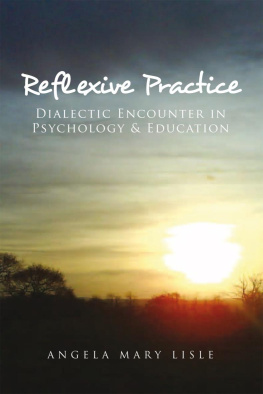RESIDENTIAL WORK WITH OFFENDERS
Residential Work with Offenders
Reflexive accounts of practice
Emma Wincup
University of Kent at Canterbury, UK
First published 2002 by Ashgate Publishing
Reissued 2019 by Routledge
2 Park Square, Milton Park, Abingdon, Oxon, OX14 4RN
52 Vanderbilt Avenue, New York, NY 10017
Routledge is an imprint of the Taylor & Francis Group, an informa business
Copyright 2002, Emma Wincup
The author has asserted her moral right under the Copyright, Designs and Patents Act, 1988, to be identified as the author of this work.
All rights reserved. No part of this book may be reprinted or reproduced or utilised in any form or by any electronic, mechanical, or other means, now known or hereafter invented, including photocopying and recording, or in any information storage or retrieval system, without permission in writing from the publishers.
Notice:
Product or corporate names may be trademarks or registered trademarks, and are used only for identification and explanation without intent to infringe.
Publisher's Note
The publisher has gone to great lengths to ensure the quality of this reprint but points out that some imperfections in the original copies may be apparent.
Disclaimer
The publisher has made every effort to trace copyright holders and welcomes correspondence from those they have been unable to contact.
A Library of Congress record exists under LC control number:
ISBN 13: 978-1-138-72955-1 (hbk)
ISBN 13: 978-1-315-18995-6 (ebk)
The debts I have incurred in researching and writing this book are numerous. Most of all I am grateful to the four probation areas for granting me access, and to the hostel workers who gave up their time to answer my questions. As none of the hostels are identified, all of these must remain anonymous. Thanks also to Jackie Swift for her efficiency in producing the text. Finally family and friends (academic or otherwise) have provided much needed support as well as welcome distractions. I would like to extend my particular thanks to Amanda Coffey and Ian Shaw for supervising one of the research studies on which this book is based.
At the beginning of the twenty-first century, writing about working with offenders in a social work series may seem an awkward anomaly. In his address to the 1995 National Probation Conference, Michael Howard (then Home Secretary) refuted the idea that punishment in the community should be equated with social work with offenders. Whilst this view may still have political support, there are some dissenting voices. Butler and Drakeford (2001) suggest that the Probation Service can still be categorised as a social work service operating within the criminal justice system, although they recognise that this is an unfashionable view. I share this view, and note that it is one that continues to be publicly endorsed in Scotland. Social work does not have to be equated with the work of statutory social service departments, and a more inclusive and catholic definition can be adopted which encompasses working with those with welfare needs. Offenders frequently experience a range of well-documented problems including poverty, unemployment, lack of education and training, homelessness, substance use and poor health. These problems warrant social work intervention. Without concerted efforts to address the welfare needs of those who appear before the courts, attempts to influence their offending behaviour will meet with only limited success (Drakeford and Vanstone, 1996a). These welfare 'needs' are increasingly being redefined as 'predictive risk factors' (Worrall, 2001). Criminal justice under the 'new penology' has come to be based on the actuarial principle of risk assessment, in other words attempting to identify, classify and manage groups sorted by level of dangerousness. Thus some offenders are subjected inappropriately to programmes aimed at 'high-risk' offenders rather than seeking to meet their welfare needs through better access to community resources. Attention to managing and assessing risk is essential but to prioritise this aspect of working with offenders over addressing their welfare needs is fundamentally at odds with the new social inclusion agenda. Talking about social work with offenders may be unfashionable, but such talk is badly needed. It lies at the heart of effective practice with offenders, a view frequently espoused by the residential workers I have met since 1995.
These residential workers have all been working in approved probation and bail hostels in England and Wales. Despite being in existence for over a century these hostels are a relatively neglected area of the criminal justice system, and for most of their history have received little academic, political or media attention. Their origins and rationale are outlined in detail in the next chapter. It is suffice here to state their current purpose and to highlight some of the distinctive feature of hostels. Their current role is to provide an enhanced level of residential supervision to a wide range of individuals. These include principally bailees, those on probation, and those released from prison on licence. Frequently hostels cater for all these groups thus mixing convicted and unconvicted individuals. This is in contrast to prisons which, at least in theory, try to separate out these categories of prisoners. A further anomaly in terms of criminal justice practice is the mixing of females and males. Hostels are frequently compared to prisons and described as a 'halfway house'. This is because hostel residents are allowed freedom of movement within the restrictions placed upon their lives by the hostel rules and any further conditions imposed on them by the courts (those on bail and on probation) or the Home Office (those on licence).
This book brings together the findings from two research projects conducted between 1994 and 1998. This first was a study of bail hostel provision for women awaiting trial. Through ethnographic methods it aimed to capture the experiences of residents and staff, highlighting the particular needs of female defendants and the ways in which bail hostels aim to offer support. Three hostels were studied: two women-only, and one mixed hostel (mixed in this context refers to accommodation for a small number of women in an otherwise male group, see Wincup, 1996). As with many qualitative studies a mass of rich and detailed data is collected which cannot always be included within the final presentation of the research findings due to time limits or word limits. In this instance I felt that the accounts of the hostel workers had been particularly neglected. A successful application for a small research grant allowed me to revisit this data, and to conduct further interviews with staff working in a men-only hostel. This study explored their particular experiences of conducting residential work with male offenders.
Those who reside in bail and probation hostels are referred to throughout the book as offenders. The term is used largely for simplicity and it is recognised that not all those who reside in approved hostels are convicted offenders.
Research strategies







